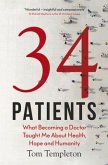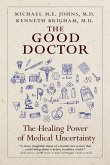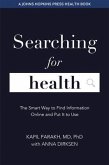Robert Maunder, Jonathan Hunter
Love, Fear, and Health
How Our Attachments to Others Shape Health and Health Care
Robert Maunder, Jonathan Hunter
Love, Fear, and Health
How Our Attachments to Others Shape Health and Health Care
- Broschiertes Buch
- Merkliste
- Auf die Merkliste
- Bewerten Bewerten
- Teilen
- Produkt teilen
- Produkterinnerung
- Produkterinnerung
Using attachment theory, Maunder and Hunter provide a practical, clinically focused introduction to the influence of attachment styles on an individual's risk of disease and the effectiveness of their interactions with health care providers.
Andere Kunden interessierten sich auch für
![Caring for and Understanding Latinx Patients in Health Care Settings Caring for and Understanding Latinx Patients in Health Care Settings]() Laura Maria PigozziCaring for and Understanding Latinx Patients in Health Care Settings42,99 €
Laura Maria PigozziCaring for and Understanding Latinx Patients in Health Care Settings42,99 €![34 Patients 34 Patients]() Tom Templeton34 Patients29,99 €
Tom Templeton34 Patients29,99 €![Unthinkable Unthinkable]() Helen ThomsonUnthinkable34,99 €
Helen ThomsonUnthinkable34,99 €![Cancer Confidential Cancer Confidential]() Hayter, MD, CharlesCancer Confidential30,99 €
Hayter, MD, CharlesCancer Confidential30,99 €![The Good Doctor The Good Doctor]() Kenneth BrighamThe Good Doctor25,99 €
Kenneth BrighamThe Good Doctor25,99 €![Searching for Health Searching for Health]() Kapil Parakh (Assistant Professor of Medicine)Searching for Health15,99 €
Kapil Parakh (Assistant Professor of Medicine)Searching for Health15,99 €![Goal-Oriented Medical Care Goal-Oriented Medical Care]() James Mold WGoal-Oriented Medical Care25,99 €
James Mold WGoal-Oriented Medical Care25,99 €-
-
-
Using attachment theory, Maunder and Hunter provide a practical, clinically focused introduction to the influence of attachment styles on an individual's risk of disease and the effectiveness of their interactions with health care providers.
Produktdetails
- Produktdetails
- Verlag: University of Toronto Press
- Seitenzahl: 344
- Erscheinungstermin: 16. September 2015
- Englisch
- Abmessung: 228mm x 151mm x 27mm
- Gewicht: 534g
- ISBN-13: 9781442615601
- ISBN-10: 1442615605
- Artikelnr.: 42700101
- Herstellerkennzeichnung
- Libri GmbH
- Europaallee 1
- 36244 Bad Hersfeld
- gpsr@libri.de
- Verlag: University of Toronto Press
- Seitenzahl: 344
- Erscheinungstermin: 16. September 2015
- Englisch
- Abmessung: 228mm x 151mm x 27mm
- Gewicht: 534g
- ISBN-13: 9781442615601
- ISBN-10: 1442615605
- Artikelnr.: 42700101
- Herstellerkennzeichnung
- Libri GmbH
- Europaallee 1
- 36244 Bad Hersfeld
- gpsr@libri.de
Robert Maunder, MD is a professor in the Department of Psychiatry at the University of Toronto and holds the Chair in Health and Behaviour at Sinai Health. His research focuses on how close relationships influence health, and on the compassionate support of resilience in healthcare workers. Clinically, he provides psychiatric care for people with chronic physical illnesses.
Introduction
Section One: Vexing Health Care
1. What is Health Care?
2. Why Else Do We Get Sick?
3. Health Happens Between Us
Summary of Part One
Section Two: Attachment & Health
Introduction to Section Two: What is Attachment?
4. Attachment Sculpts the Brain
5. All Grown Up and Still Attached
6. Feeling secure is Good For You
7. Depression
8. Attachment is a Response to Stress
9. Why Are So Many of Us Fat, Drunk, Stationary Smokers?
10. I Don’t Know What You Have But I’ve Seen It Before and You Have It Bad
11. Trouble in the Patient-Provider Relationship
Summary of Part Two
Section Three: Relational Health Care
Introduction to Section Three: Principles of Adaptation and Change
12. How Health Care Providers Can Adapt When Attachment Anxiety Interferes
13. How Health Care Providers Can Adapt When Attachment Avoidance
Interferes
14. How Health Care Providers Can Adapt When Fearful Attachment Interferes
15. Changing the System
16. Becoming More Secure
17. Beyond Health Care Relationships: A Wider attachment Perspective on
Health
Afterword
Section One: Vexing Health Care
1. What is Health Care?
2. Why Else Do We Get Sick?
3. Health Happens Between Us
Summary of Part One
Section Two: Attachment & Health
Introduction to Section Two: What is Attachment?
4. Attachment Sculpts the Brain
5. All Grown Up and Still Attached
6. Feeling secure is Good For You
7. Depression
8. Attachment is a Response to Stress
9. Why Are So Many of Us Fat, Drunk, Stationary Smokers?
10. I Don’t Know What You Have But I’ve Seen It Before and You Have It Bad
11. Trouble in the Patient-Provider Relationship
Summary of Part Two
Section Three: Relational Health Care
Introduction to Section Three: Principles of Adaptation and Change
12. How Health Care Providers Can Adapt When Attachment Anxiety Interferes
13. How Health Care Providers Can Adapt When Attachment Avoidance
Interferes
14. How Health Care Providers Can Adapt When Fearful Attachment Interferes
15. Changing the System
16. Becoming More Secure
17. Beyond Health Care Relationships: A Wider attachment Perspective on
Health
Afterword
Introduction
Section One: Vexing Health Care
1. What is Health Care?
2. Why Else Do We Get Sick?
3. Health Happens Between Us
Summary of Part One
Section Two: Attachment & Health
Introduction to Section Two: What is Attachment?
4. Attachment Sculpts the Brain
5. All Grown Up and Still Attached
6. Feeling secure is Good For You
7. Depression
8. Attachment is a Response to Stress
9. Why Are So Many of Us Fat, Drunk, Stationary Smokers?
10. I Don’t Know What You Have But I’ve Seen It Before and You Have It Bad
11. Trouble in the Patient-Provider Relationship
Summary of Part Two
Section Three: Relational Health Care
Introduction to Section Three: Principles of Adaptation and Change
12. How Health Care Providers Can Adapt When Attachment Anxiety Interferes
13. How Health Care Providers Can Adapt When Attachment Avoidance
Interferes
14. How Health Care Providers Can Adapt When Fearful Attachment Interferes
15. Changing the System
16. Becoming More Secure
17. Beyond Health Care Relationships: A Wider attachment Perspective on
Health
Afterword
Section One: Vexing Health Care
1. What is Health Care?
2. Why Else Do We Get Sick?
3. Health Happens Between Us
Summary of Part One
Section Two: Attachment & Health
Introduction to Section Two: What is Attachment?
4. Attachment Sculpts the Brain
5. All Grown Up and Still Attached
6. Feeling secure is Good For You
7. Depression
8. Attachment is a Response to Stress
9. Why Are So Many of Us Fat, Drunk, Stationary Smokers?
10. I Don’t Know What You Have But I’ve Seen It Before and You Have It Bad
11. Trouble in the Patient-Provider Relationship
Summary of Part Two
Section Three: Relational Health Care
Introduction to Section Three: Principles of Adaptation and Change
12. How Health Care Providers Can Adapt When Attachment Anxiety Interferes
13. How Health Care Providers Can Adapt When Attachment Avoidance
Interferes
14. How Health Care Providers Can Adapt When Fearful Attachment Interferes
15. Changing the System
16. Becoming More Secure
17. Beyond Health Care Relationships: A Wider attachment Perspective on
Health
Afterword









